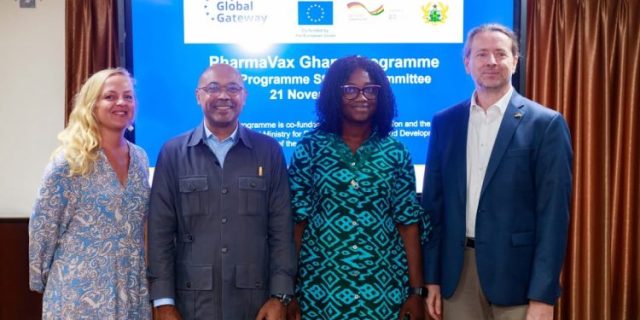European Union Ambassador to Ghana, Irchad Razaaly, has expressed optimism that the European Union and the German Ministry for Economic Cooperation and Development’s Pharmavax project will be transformational for Ghana’s pharmaceutical sector.
The Pharmavax project aims to help Ghana emerge as a regional hub for vaccine production and reduce the continent’s heavy dependence on pharmaceutical imports, backed by €33 million in funding.
Speaking in an interview following the inaugural steering committee engagement on the Pharmavax project, Mr. Razaaly emphasized that the project would proceed regardless of any change in government after the December 7 elections.
“What we are doing is to support the rising establishment and thriving of a sound vaccine-producing and manufacturing ecosystem for vaccines and medicines. The steering committee involves all the stakeholders.” Irchard Razaaly said
“Ghana academia is involved and involves all the stakeholders; we are not working from scratch. There is very reputable academia in Ghana. We are identifying needs in terms of human resources, the type of training, and the type of education.” he further addedMs. Franziska Jebens, Head of Development Cooperation at the German Embassy, praised Germany’s contribution of nearly €10 million to the €33 million initiative focused on enhancing vaccine, medicine, and health technology manufacturing and access across Africa. She highlighted that Germany’s support reflects a broader commitment to fostering sustainable and inclusive economic growth through local manufacturing, research, and skills development.
Dr. Dirk Aßmann, Country Director of GIZ Ghana, described PharmaVax Ghana as a testament to collective dedication to empowering local manufacturers, advancing research, and strengthening regulatory standards, positioning Ghana as a leader in pharmaceutical production in Africa.
About the Pharmavax Project
The EU Pharmavax Project is a collaborative initiative led by the European Union and the German Ministry for Economic Cooperation and Development, aimed at transforming Ghana into a regional hub for vaccine and pharmaceutical production.
Backed by €33 million in funding, the project seeks to reduce Africa’s reliance on pharmaceutical imports by promoting local manufacturing, advancing research, and developing health technologies.








































